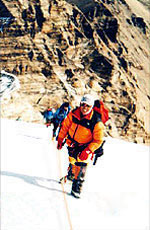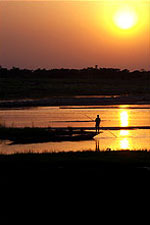- Trekking in Nepal
- Trek Itinerary
- Equipment Checklist
- Useful Info on Trekking
- Trekking Season Guide
- Trekking Grade
- Trekking Permit
- Cultural Trek/Tour
- New Trekking Areas
- Peak Climbing in Nepal
- Mountaineering Info
- Tibet Tour/Trek
- Useful Info on Tibet
- Sikkim & Darjeeling
- Bhutan Tour
Other Activities
Frequently Asked Questions
Q: What is the general duration of the treks?A: The duration of the trek depends on the region of the trek and on interests which you have. Generally speaking, your trek can range from 2-3 days to month time or longer periods if you wish. Even the same trek can be of a different duration for different trekkers depending on their wishes and interests on the route.
Q: How difficult are the treks?
A: Difficulty of the treks depends on the region of the trek and duration of it. Shorter treks tend to be easier while longer ones require some physical fitness.
Q: What is the Tea House Trek?
A: Tea House Trek - is a trek during which at the end of each trekking day you stay for overnight in Tea Houses. “Nepal Mountain Trekking” also organizes Camping Treks during which you stay for overnight in tents which our guides will set up for you and food during such treks will be cooked by our experienced cook.
Q: What can I expect from Tea House?
A: Tea House is the combination of guest house, restaurant, and social hang out. Many years experience of “Nepal Mountain Trekking” in field of organizing various treks in Nepal assures you that we have chosen for our treks the cleanest and most hygienically kept Tea Houses with friendly atmosphere and best views. Most of the Tea Houses have running water facility. Many of them have hot water available for bathing. But we discourage our groups from using water heated by wood as lack of firewood in most villages is a big environmental concern in Nepal.
Q: What facilities we will have in Tea House?
A: Private rooms are available in most tea houses except for high altitudes ones. Most bathrooms are shared. Most of the Tea Houses have running water facility.
Q: Where do we eat our meals and what kind of food is available?
A: During a Tea House trek you will have breakfast and dinner in the Tea House, lunch will be eaten at one of the trail side restaurants. During a Camping Trek all food will be cooked by our experienced cook. Every Tea House serves the traditional Nepali meal Dal Bhat (rice and lentil soup). All Tea Houses of our routs have variety of different food items, such as rice, vegetables, noodles, potatoes and soup. Many of them have western food on menu. Soft drinks, snacks and beer are available in most of the Tea Houses and trail side restaurants.
Q: Is it safe to eat during the trek?
A: Food safety is always a big concern and we take it very seriously. That is why we have chosen the cleanest and most hygienically kept Tea Houses for our routs. During a Camping Trek our cook prepares safe and tasty meals from carefully chosen food items and only hygienic cleaning facilities are used.
Q: What are the sources of drinking water supply during trekking?
A: All Tea Houses have boiled water for trekkers. And on the trek you will be provided with drinking water by your guide. The guide will make sure that water is safe for drinking.
Q: What is the best time for trekking?
A: Best time for trekking is autumn (October-November) and spring (end of February-April). Short treks and some Tea Houses treks can be done during winter season as well.
For more details on trekking season of different routes check our season guide
Q: What is the weather like?
A: You need to be prepared for sudden weather changes while trekking. That’s why trekking equipment should be chosen carefully before the trip. Sudden rain storms or snow are always a possibility which needs to be considered. The weather during the trekking season is somewhat more stable. “Nepal Mountain Trekking” pays big attention to weather forecast, so you will be told about weather prognosis and you will be given advises before trek.
Q: What kind of clothes is needed for trekking?
A: Choosing the clothes for trekking is very important. Please, check our trekking equipment list for details.
Q: What type of shoes should I have?
A: For shorter treks comfortable tennis shoes or snickers is enough while longer treks require carefully chosen hiking boots which should be kind of strong, well-made but light boots. Shoes and boots are best to buy before arriving in Nepal. Proper fit is a must for boots and we advise you to wear your new shoes for sometime before trek for your feet to feel absolutely comfortable during trekking.
Q: Should we bring all trekking equipment with us?
A: You can easily rent needed equipment for reasonable price in Kathmandu or Pokhara before trek but it’s always preferable and more convenient to have your own equipment during trekking, so we advise you to bring equipment with you or to buy here as most of the outdoor equipment can be bought in Kathmandu or Pokhara in one of the many outdoor gear shops.
Q: What problems can arise on altitude?
A: Altitude sickness is a serious problem. “Nepal Mountain Trekking”, having many years of experience in trekking and good knowledge of the problem, organizes treks very carefully. Extra day of acclimatization is included in all our high altitude treks. Our guides are trained to spot any signs of altitude sickness and know how to deal with it.
Q: What happens in case of emergency?
A: “Nepal Mountain Trekking” is prepared for any emergency situation and knows how to handle it. Our guides are trained in first aid and can deal with most of the basic ailments that occur during a trek. Every client should have his own insurance before coming to Nepal for case of emergency.
Q: What sort of experience do your guides have?
A: Guides of “Nepal Mountain Trekking” have many years of guiding experience in Nepal as well as Tibet. Most of them have been spending years exploring the country. Our guides are trained in first aid and know how to handle any situation. All our guides speak fluent English and happy to share their deep knowledge of the country and beauty of Nepal with you. We believe in and follow the idea that it’s not enough to take visitors to special places or special cultures, we need to provide guides who can get people feel involved in what they are experiencing, explain it thoroughly and keep them entertained.
Main concern of “Nepal Mountain Trekking” is to make your trip in Nepal safe, memorable and fun!


















